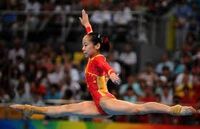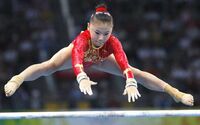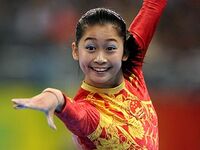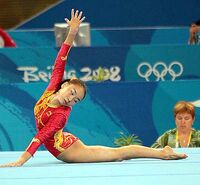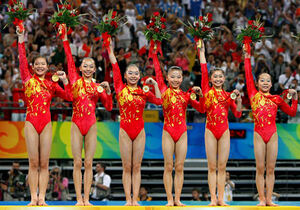
From left: Cheng Fei, Yang Yilin, Li Shanshan, He Kexin, Jiang Yuyuan, Deng Linlin
These gymnasts were a member of the Chinese gold medal-winning team at the 2008 Olympics in Beijing. This team is similar to the Magnificent 7, as they won their first team title on home soil.
About the Team
Of the team, only Cheng Fei had competed at an Olympic Games before, in Athens. After Athens, she became incredibly successful, winning three straight vault titles at the 2005, 2006, and 2007 World Championships, as well as a World floor exercise title in 2006. She became known for her excellent execution of the 2½ twisting Yurchenko, and submitted her own vault to the FIG: a round-off, half-on, 1½ twist off. It was named "The Cheng" and given a 6.5 start value in the 2006-2008 Code of Points, same as the 2½ twisting Yurchenko. She was also a member of the Chinese team at the 2006 World Championships, where they won their first World team gold medal, and at the 2007 World Championships along with Yang Yilin, Jiang Yuyuan, and Li Shanshan, where the Chinese won the silver medal behind the United States. Deng Linlin and He Kexin were new additions to the team. He, in particular, was a specialist on uneven bars with an incredibly difficult routine. Cheng was named captain of the team.
Age Controversy
In early 2008, Yang Yun, who won two bronze medals at the 2000 Summer Olympics, admitted on state-run television that she was 14 when she had competed. Consequently, there was frequent speculation that members of the Chinese women's gymnastics team were 14 years of age or under, violating the minimum age requirements of Fédération Internationale de Gymnastique (FIG), the governing body of the sport, that requires gymnasts to be 16. Younger gymnasts are lighter and more supple than adult gymnasts, and have also been said to be more fearless when performing difficult manoeuvres.
The New York Times claimed that official media and some official Web sites in China, including that of the State General Administration of Sport, listed Chinese gymnasts' details which indicated that He Kexin, Jiang Yuyuan and Yang Yilin may have been as young as 14. During the Olympics, media focused their attention on He, Yang, Jiang, and Deng. In response, Chinese officials claimed the discrepancies for He Kexin were caused by paperwork errors when the gymnast switched teams. Chinese authorities presented passport information to show that they were 16 years old as of 2008. Chinese coach Lu Shanzhen explained that Chinese competitors had for years all been small. "It is not just this time. It is a question of race. European and American athletes are all powerful, very robust. But Chinese athletes... are by nature that small." Sportswriter E.M. Swift criticized the IOC for "spend[ing] millions of dollars trying to ferret out drug cheats [while ignoring] allegations of institutionalized cheating" by the Chinese government.
On 22 August 2008 the International Olympic Committee (IOC) instructed the FIG to investigate the allegations that He Kexin was under-age, and were asked to report back to the IOC later that day. The FIG accepted passport ages as valid proof and declared gymnasts eligible. On 23 August, further pressure led the FIG to request additional documentation on five of the six athletes on the Chinese team. IOC president Jacques Rogge said that FIG had demanded "birth certificates and all the documents like family books, entries in schools and things like that." While the FIG investigation was in progress, the IOC indicated reshuffling of the medals was unlikely. Having been satisfied with the proof of age received from the Chinese Gymnastics Association, the FIG ended the investigation on 1 October 2008, concluding that He and her teammates were eligible to compete.
In a related story, Yang's teammate in 2000, Dong Fangxiao, was subsequently revealed to have lied about her age. She claimed to have been 17 in 2000, but worked as a technical official at the 2008 Games, and her certification gave a birthdate of 1986--which would have made her 14 years old in 2000. In 2010, the FIG erased Dong's scores, and the IOC stripped China of its team bronze for 2000 and from the 1999 World Championships.
Preliminary Round
The Chinese performed in the first subdivision, alongside Romania. They performed very well, finishing first on uneven bars and floor exercise as a team and second on vault and balance beam. Yang competed on all four events, and qualified third to the all-around and first to the uneven bars final. Jiang competed on all four events, and qualified sixth to the all-around and eighth to the floor exercise final. He competed on vault and uneven bars, and qualified sixth to the uneven bars final. Li competed on beam and floor, and qualified first to the balance beam final. Cheng competed on vault, beam, and floor, and qualified first to the vault and floor exercise finals, and fifth to the balance beam final. Deng competed on all four events, but did not score high enough to qualify for the all-around or individual event finals. The Chinese team qualified first to the team final.
Team Final
Having qualified first to the team final, the Chinese went first on vault. Yang was the first to vault and scored a 15.100. Cheng went up next and put up a 16.000 for her 2½ twisting Yurchenko. Originally, Jiang was meant to be in the vault lineup in the team final, but she was having problems putting her 2½ twisting Yurchenko vault to her feet, and was switched out in favor of Deng. Deng stuck her double twisting Yurchenko and scored a 15.250. They were in third place heading into the second rotation behind Russia and the United States.
The Chinese then moved to uneven bars, their best event. Jiang went up first and hit her routine well to score a 15.975. Yang went up next and scored a 16.800. He went up last and performed her routine wonderfully to score a 16.850, one of the highest scores of the evening. They entered the second rotation in first place.
The Chinese moved on to balance beam, one of their better events. Cheng went up first and surprisingly fell on her tucked full. She still scored a 15.150, her high difficulty keeping the score above 15. Deng went up next and despite a few tiny mistakes scored a 15.925. Li went up next and scored a 16.050. China went to the last rotation still in first place.
After the Americans made several mistakes on beam and floor, the Chinese performed last on floor exercise, knowing exactly what they needed in order to win. Deng went up first on floor and performed her routine wonderfully to score a 15.150. Jiang went up next and absolutely sold her routine, really playing to the home crowd with her music and choreography. She scored a 15.200. Cheng went up last. She put her beam fall out of her mind and lived her routine, getting emotional just as her music ended. She scored a 15.450 to win China their first Olympic team gold medal.
This was a game the Chinese were going to win regardless. They had the highest start values of any other team in the competition, which allowed them to win even with Cheng falling on balance beam.
After the Team Final
In the all-around, Yang performed first on vault and scored a 15.175. Jiang performed fourth but fell on her 2½ twisting Yurchenko, scoring a 14.825. Yang was in sixth at the end of the first rotation and Jiang was in thirteenth. On uneven bars, Jiang performed third and hit her routine to score a 15.875. Yang performed sixth and scored a 16.725, the highest score of the night. Yang entered the third rotation in first and Jiang in sixth. On balance beam, Jiang performed second. Despite a few balance checks, she scored a 15.425. Yang performed fifth with a well executed routine and scored a 15.750. Yang was in second heading into the last rotation and Jiang was in fifth. On floor exercise, Jiang performed first. She had a couple low landings on her passes and fell out of her triple turn, scoring a 14.775. Yang performed fourth with a beautifully expressive routine that had one minor error. She scored a 15.000 and won the bronze behind USA's Nastia Liukin and Shawn Johnson. Jiang finished sixth.
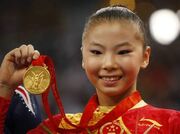
He with her uneven bars gold medal
In the vault final, Cheng was the favorite for the gold until she fell on her own "Cheng" vault. Somewhat controversially, she still medaled, winning the bronze behind North Korea's Hong Un-Jong and Germany's Oksana Chusovitina. In the uneven bars final, Yang scored a 16.650. He scored a 16.725, which originally tied her for the gold with USA's Nastia Liukin. However, a tie breaker was induced to declare a single gold medalist. The execution scores were broken down and the gold medal was awarded to He. Yang won the bronze. In the balance beam final, Li fell on her Rufolva, and while her high start value still got her a silver medal with a fall in the previous World Championships, it couldn't save her here. She scored 15.300 and placed sixth. Cheng scored 15.950, much improved from the team final, and won the bronze behind USA's Shawn Johnson and Nastia Liukin. In the floor exercise final, Jiang performed well and scored a 15.350. Cheng, however, fell out of her triple turn and underrotated her fourth tumbling pass, sitting down. She scored a 14.550 and finished seventh. She was visibly upset with her performance. Jiang finished fourth, just outside the medals. Romania's Sandra Izbasa took the gold, and USA's Shawn Johnson and Nastia Liukin took silver and bronze, respectively.
The Chinese wound up with six medals, two gold and four bronze.
Template:OlympicTeamChampions
All items (13)


